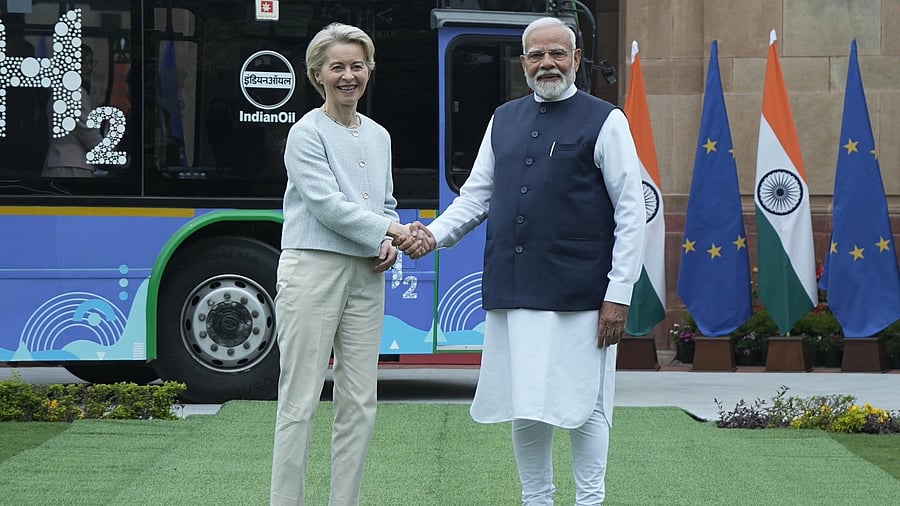
Prime Minister Narendra Modi and European Commission president Ursula von der Leyen
Credit: X/@MEAIndia
New Delhi: India and the European Union on Friday set the target to conclude the protracted negotiation for the bilateral Free Trade Agreement by the end of the year, even as they agreed to explore a defence and security partnership.
Prime Minister Narendra Modi and European Commission President Ursula von der Leyen tasked the respective teams “to pursue negotiations for a balanced, ambitious, and mutually beneficial FTA with the aim of concluding them within the course of the year, recognizing the centrality and importance of growing India-EU trade and economic relations”. They asked the officials to work as trusted partners to enhance market access and remove trade barriers. They also tasked them to advance negotiations on an Agreement on Investment Protection and an Agreement on Geographical Indications.
New Delhi and Brussels sought to add momentum to the negotiations for a trade deal, with both being keen to find ways to cushion the impact of the tariff wars launched by the United States in the past few weeks after President Donald Trump’s return to the White House.
“It is crucial to conclude a mutually beneficial FTA and Investment Protection Agreement as soon as possible,” Modi told journalists after he and Leyen met at the Hyderabad House in New Delhi. He stressed strengthening India-EU cooperation in building resilient supply chains.
“Our capabilities can complement each other in sectors such as electronics, semiconductors, telecom, engineering, defence, and pharma. This will strengthen diversification and de-risking and will aid in the creation of a secure, reliable and trusted supply and value chain,” said the prime minister.
“We are expecting a lot from our trade negotiators. We told them they should surprise us. Now more than ever, the geopolitical context asks for decisive action,” said Leyen.
She earlier in the day announced that the EU were exploring a future security and defence Partnership with India in the mould of the partnerships the bloc already had with Japan and South Korea.
"This will help us step up our work to counter common threats whether on cross-border terrorism, maritime security threats, cyber-attacks or the new phenomenon we see – attacks on our critical infrastructure,” said the president of the European Commission.
India’s bilateral trade in goods with the EU stood at $135 billion (with exports to the EU at $76 billion and imports from the EU at $59 billion) in FY 2023-24. The 27-nation bloc is India’s largest trading partner in goods. The bilateral Trade in services in 2023 stood at $53 billion (comprising India’s exports worth $30 billion and imports worth $23 billion), registering the highest-ever trade in services. The EU investments in India are valued at over $117 billion, with around 6,000 European companies present in India. India’s investments in the EU are valued at around $40 billion.
The negotiations between India and the EU for an FTA had remained stalled for nine years since 2013 due to differences over the scope of the agreement.
The two sides relaunched the negotiations in June 2022.
Though the leaders sought to add momentum to the negotiations, the two sides would have to narrow differences on a number of contentious issues, like the EU’s demand for India to lower tariffs on cars, whiskey and wine and India’s demand for concessions from the EU for its micro, small and medium enterprises. New Delhi also wants the EU to address its concerns over the Carbon Border Adjustment Mechanism (CBAM), which could result in higher duties on steel and aluminium exports from India to Europe.
Both sides have held in-depth discussions on trade and decarbonization through several bilateral channels and have engaged jointly with stakeholders, especially on the implementation of the EU’s CBAM, according to the joint statement issued after the meeting of the India-EU Trade and Technology Council on Friday. “Both sides discussed the challenges arising out of CBAM implementation, in particular for the small and medium enterprises and agreed to continue addressing them.”
